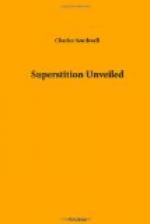Now, Universalists agree with Lord Brougham as to the traditionary basis of Scripture; and as they also agree with Chalmers and Watson with respect to there being no natural proof of a God, they stand acquitted to their own consciences of ‘wilful deafness’ and ‘obstinate blindness,’ in rejecting as inadequate the evidence that ‘God is,’ drawn either from Nature, Revelation, or both.
It was long a Protestant custom to taunt Roman Catholics with being divided among themselves as regards topics vitally important, and to draw from the fact of such division an argument for making Scripture the only ‘rule of faith and manners.’ Chillingworth said, there are Popes against Popes, councils against councils, some fathers against others, the same fathers against themselves—a consent of fathers of one age against a consent of fathers of another age, the church of one age against the church of another age. Traditive interpretations of Scripture are pretended, but there are few or none to be found. No tradition but only of Scripture can derive itself from the fountain, but may be plainly proved, either to have been brought in in such an age after Christ, or that in such an age it was not in. In a word, there is no sufficient certainty but of Scripture only for any considering man to build on. [43:1] And after reading this should ‘any considering man’ be anxious to know something about the Scripture on which alone he is to build, he cannot do better than dip into Dr. Watt’s book on the right use of Reason, where we are told every learned (Scripture) critic has his own hypothesis, and if the common text be not favourable to his views a various lection shall be made authentic. The text must be supposed to be defective or redundant, and the sense of it shall be literal or metaphorical according as it best supports his own scheme. Whole chapters




